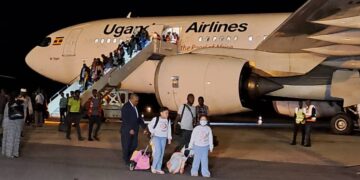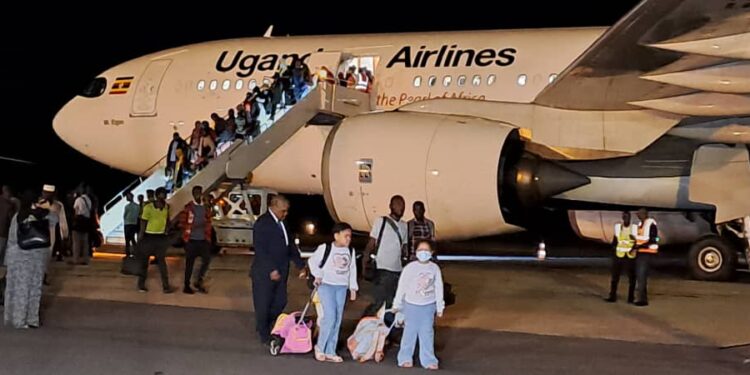A total of 211 Ugandans who were evacuated from Khartoum, the volatile capital of Sudan, have safely returned home following a directive by President Yoweri Kaguta Museveni.
The evacuees arrived at Entebbe International Airport Thursday morning.

“211 Ugandans living and working in the Republic of Sudan have this morning 27th April 2023 arrived in the country aboard Uganda Airlines following a successful evacuation directed by H.E Kaguta Museveni,” said the Ministry of Foreign Affairs.
The evacuees in the company of Ambassador Joseph Ocwet, Director General of External Security Organisation (ESO), composed of diplomats, students, and business expatriates, touched down at 02:30 am at Entebbe International Airport, Uganda from Bahir Dar Airport in Northern Ethiopia.

On arrival, the returnees were received by General Muhoozi Kainerugaba, Senior Presidential Advisor on Operations, who is the designated supervisor of the special evacuation operation.
“Allow me to appreciate His Excellency, President Museveni and the government of Uganda for all the efforts which have been made to make sure that a number of 211 Ugandans have been evacuated today from Bahir Dar Airport in Ethiopia,” said the Ugandan Ambassador to Sudan, Dr Rashid Yahya Ssemuddu.
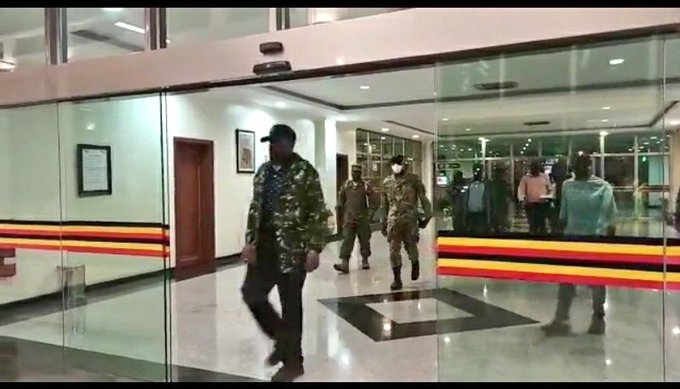
He quoted the Prophet Muhammad, peace and blessings be upon him, who said, “Whoever does not thank people has not thanked Allah.”
He said about 10 days back, the fighting started in Sudan between the paramilitary Rapid Support Forces (RSF) under its former commander and current Sudan Vice President, Lt Gen Mohamed Hamdan (aka Hemeti), and the Sudan Armed Forces (SAF) under General Abdel Fattah al-Burhan, the de facto leader of Sudan and chairman of Sovereign Council.
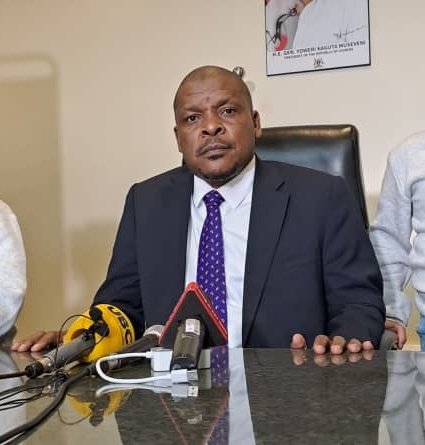
The RSF emerged from the Janjaweed militia that then-president Omar al-Bashir unleashed in the Darfur region two decades ago.
The two generals seized power in the 2021 coup, but later fell out, most recently over the planned integration of the RSF into the regular army.
According to Amb Ssemuddu, Hemeti tried to overthrow the government of al-Burhan by attacking the presidential palace and the airport in Khartoum.

“From that day, the bombings have been everywhere in town. The government in return, used their army to bomb the camps of RSF in Khartoum. That is how the war started and a lot of infrastructure has been damaged in a short time. So many people have been killed on both sides,” said Amb Ssemuddu.
When asked how many people have been left behind, Amb Ssemuddu said the total number of Ugandans in Sudan was 300 including a team working at the Ugandan embassy, 19 others who were in transit to Mecca, 120 students at Africa International University, 120 working in Khartoum and a few others who were on a short visit.

“We were able to reach them through the leadership of the Ugandan Community and Student Community in Khartoum. We also have a small number of Ugandans who are on treatment at Salaam Hospital.”
He said apart from the 211 Ugandans evacuated through Ethiopia, eight were evacuated with the help of the Saudi Arabian embassy, three made their way through Port Sudan, seven were helped by the United Nations and others also used the Ethiopia-Sudan border or Southern Sudan.
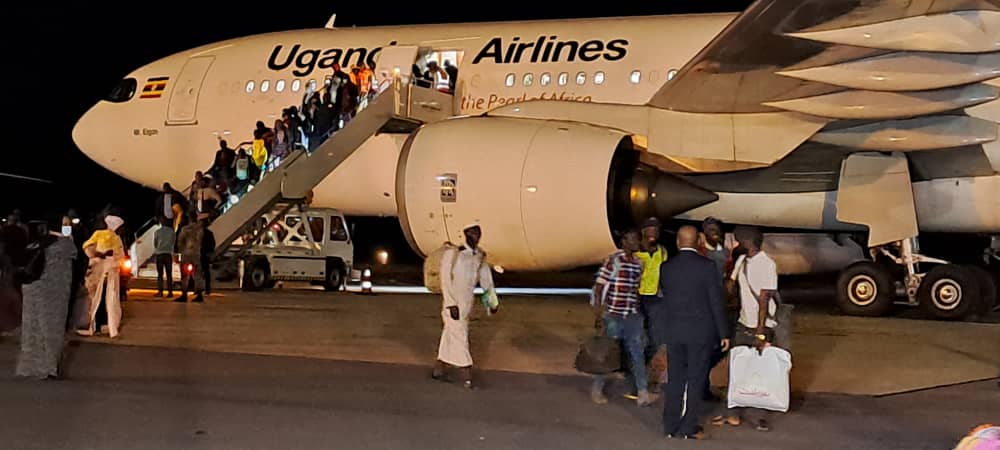
“So, that covers a number of around 250. I can say that we are remaining with roughly 50 Ugandans who are yet to come back home. But we are following them up. We formed a database to keep locating them and we are also requesting their colleagues to keep updating us so that we can reach them wherever they are. We are working hard to make sure that they also come back home.”
A US-brokered ceasefire between Sudan’s warring generals entered its second day Wednesday but remained fragile after witnesses reported fresh air strikes and paramilitaries claimed to have seized a major oil refinery and power plant.

UN Special Representative Volker Perthes told the Security Council Tuesday that he maintained contact with both generals: army chief Abdel Fattah al-Burhan and his deputy-turned-rival, Mohamed Hamdan Daglo, who commands the heavily armed paramilitary Rapid Support Forces (RSF).
Fighting has killed at least 459 people and wounded more than 4,000 across Africa’s third-biggest country, according to UN agencies.

